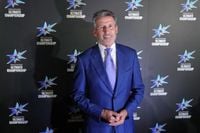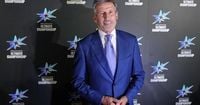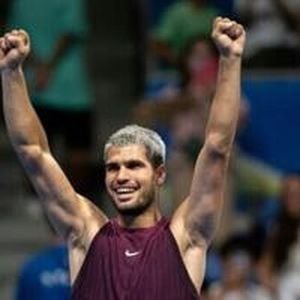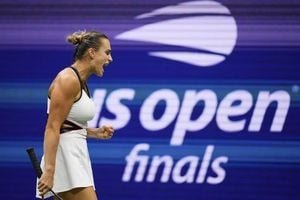In a year already marked by fierce debates and shifting alliances in the world of sports, the ban on Russian athletes from major international competitions remains one of the hottest topics. On September 12, 2025, Sebastian Coe, the president of World Athletics, reaffirmed the organization’s unwavering stance: Russian athletes will not be allowed to compete in the upcoming World Athletics Championships or any other major events until a peace settlement is reached in the ongoing war in Ukraine.
This decision, announced in Tokyo on the eve of the highly anticipated championships, underscores the hard-line approach World Athletics has consistently maintained—one that stands in stark contrast to the more flexible policies adopted by other Olympic sports. While many international federations allowed Russian athletes to participate as “neutral” competitors at the Paris Olympics in 2024 and various world championships, track and field’s governing body has chosen a different path.
“It’s pretty obvious that we want a full contingent,” Coe said, responding to questions about the policy’s future. “We need a settled position. We need a peaceful agreement before we can move off that landscape.” According to Coe, the current situation is unsustainable, not just for athletics but for the entire sporting world. “No, nothing has changed,” he confirmed, reiterating the organization’s position. “I hope to God that it does change—not just for athletics—because it’s an unsustainable situation.”
Russian athletes have been largely absent from major international track meets for nearly a decade. The roots of this exclusion stretch back to the fallout from the 2014 Winter Olympics in Sochi, where a massive doping scandal and subsequent coverup led to sweeping sanctions. Even after World Athletics lifted the original doping-related ban in 2022, a new prohibition was quickly enacted in response to Russia’s invasion of Ukraine. The result? Russian track and field stars have watched from the sidelines as their peers compete on the world stage.
The 2025 World Athletics Championships, set to take place at Japan’s $1.4 billion National Stadium—a gleaming venue built for the 2020 Tokyo Olympics—will feature approximately 2,000 athletes from 200 countries. It’s a truly global event, held in a stadium that previously hosted the pandemic-delayed 2020 Games, which went on without fans in the stands. At those Olympics, only 10 Russian athletes were granted spots as “Authorized Neutral Athletes.” Among them was high jump sensation Maria Lasitskene, who captured gold but has not appeared in a major international event since.
The exclusion of Russian athletes isn’t limited to track and field. The International Bobsleigh & Skeleton Federation (IBSF) recently confirmed it will uphold its own indefinite ban on Russian competitors for the 2025/26 season, including all qualification events for the 2026 Winter Olympic Games in Milan and Cortina d’Ampezzo. This move was solidified at a recent IBSF congress in Cortina d’Ampezzo, where a decisive majority voted to continue barring Russian athletes from international competitions—regardless of neutral status.
“We are in Cortina d’Ampezzo, and this is where the Olympic Games will begin in just a few months. Today, the Congress of the International Bobsleigh & Skeleton Federation has concluded here. At this Congress, a decision was made to disallow Russian athletes from international competitions in the 2025/26 season, even in neutral status. I am very grateful to my colleagues for making a fair, balanced decision,” a member of the Ukrainian sports federation stated. The emotions, they said, were “extremely positive,” reflecting the significant effort invested in advocating for the ban to remain in place.
The IBSF’s decision aligns with recommendations from the International Olympic Committee (IOC), which in 2023 urged all federations to maintain restrictions on Russian and Belarusian athletes, even under neutral status. The ripple effect has been felt in other winter sports as well: Russian athletes have already been barred from the 2026 Olympic competitions in luge and hockey. In a notable development, France will replace Russia in both the men’s and women’s hockey tournaments at the upcoming Games.
This ongoing exclusion is not without controversy. Track and field’s steadfast approach is viewed by some as a necessary stand for sporting integrity and solidarity with Ukraine, while others argue it penalizes athletes for the actions of their government. Many Olympic sports, including swimming and fencing, have tried to find a middle ground by admitting Russians as “neutral” competitors, aiming to balance fairness to individual athletes with broader political and ethical concerns. But World Athletics, under Coe’s leadership, has shown no inclination to follow suit.
“Track and field’s hard-line stance is an outlier among Olympic sports,” observed a recent report. Indeed, the policy has sparked debate within the global sporting community, with some calling for unity and others insisting that a firm response is essential. The contrast is especially stark when compared to the Paris Olympics of 2024, where Russians—albeit in limited numbers—were permitted to compete without national symbols or anthems.
The ban’s impact on the athletes themselves cannot be understated. For competitors like Maria Lasitskene, whose Olympic gold in high jump was a career-defining moment, the absence from subsequent championships has been a bitter pill to swallow. The policy also raises questions about the future of Russian sport on the international stage and the prospects for young athletes who have yet to make their mark.
As the world turns its eyes to Tokyo and the 2025 World Athletics Championships, one thing is clear: the field will be missing some familiar faces. With about 2,000 athletes from 200 nations set to compete, the event promises drama, excitement, and world-class performances—but the ongoing absence of Russian competitors will remain a topic of conversation both on and off the track. Will this stance prompt movement toward peace, or will it simply deepen the divide?
For now, the message from World Athletics is resolute: until there is a peaceful resolution to the conflict in Ukraine, the ban will remain in place. The sporting world waits, hoping for a future where politics no longer dictate who can chase their dreams on the world’s grandest stages.






